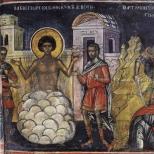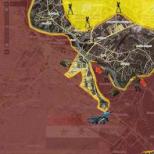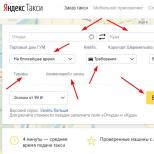Fidel Castro's eldest son committed suicide. Fidel Castro's eldest son, who worked as a nuclear scientist, committed suicide
Illustration copyright Getty Images
68-year-old Fidel Angel Castro Diaz-Balart, the eldest son of Fidel Castro, committed suicide in Cuba. This came 15 months after the death of his father, who died in November 2016 at the age of 90.
Fidel Castro Diaz-Balart received the nickname "Fidelito" due to his strong physical resemblance to his father.
According to the official version, in recent months After the death of his father, Fidel Castro Diaz-Balart was in a state of severe depression and was undergoing treatment in the hospital. Shortly before his suicide, he was transferred to outpatient treatment.
The Cuban media reported nothing about the serious mental disorder, which Fidelito was diagnosed with. Information about the personal life and health of members of the Castro family is almost not discussed in the media, so almost no one knew about the health problems of Fidel Castro’s eldest son.
Fidelito - The only son Fidel Castro from his marriage to Mirta Diaz-Balart, daughter of Cuban politician Rafael José Diaz-Balart.
Illustration copyright Getty Images Image caption Higher education Fidelito received in the USSR, where he studied under the name Jose Raul FernandezFidelito was born in 1949. When he was five years old, the family split up, and the issue of his upbringing became the subject of bitter disputes between Fidel Castro and the family of Mirta Diaz-Balart.
In 1955, Mirta Diaz-Balart took her son to Florida. Fidel Castro was imprisoned at this time: in 1953, he was sentenced to 15 years in prison for an attack on the military town of Moncada.
After the overthrow of the Fulgencio Batista regime in Cuba, Castro returned his son to his homeland.
Many older Cubans remember how a boy dressed in military uniform olive-colored, appeared in public accompanied by his father on January 8, 1959, when he returned to Havana after the Cuban Revolution.
Fidelito was the nephew of the current leader of Cuba, Raul Castro, and the cousin of one of the most consistent critics of the Cuban regime, former American congressman Lincoln Diaz-Balart.
Study and work in the USSR
Fidelito, unlike the other five children of Fidel Castro, held responsible positions in the leadership of Cuba, but he cannot be called a politician. He was more interested in science.
Fidelito received his higher education in the USSR, where he studied under the name Jose Raul Fernandez.
Illustration copyright Reuters Image caption Fidel Angel Castro Diaz-Balart and Paris Hilton during the 2015 International Cigar FestivalIn 1968, after studying at the preparatory faculty in Kharkov, Fidel Angel Castro Diaz-Balart entered the physics department of Voronezh State University.
In 1970, he transferred to Moscow State University named after M.V. Lomonosov, who graduated with honors in 1974, receiving a diploma in nuclear physics.
After graduating from university, he spent another four years as a graduate student at the Joint Institute for Nuclear Research in Dubna. In 1978 he successfully defended candidate's thesis By nuclear physics at the Institute of Atomic Energy named after. Kurchatov, then did an internship at this institute for another year and did an internship at the Novovoronezh NPP.
Returning to his homeland, he headed the Cuban Atomic Energy Commission and was its leader until the collapse of the USSR in 1992, when the Cuban nuclear program was curtailed.
From 1983 to 1992, Fidel Castro Diaz-Balart represented his country at the IAEA.
In 1999, he was appointed assistant minister of industry of Cuba.
In recent years, he has been a scientific adviser to the State Council and served as vice president of the Cuban Academy of Sciences.
"Tired of being Castro"
During his career as a scientist, Fidel Castro Diaz-Balart wrote about 150 scientific articles and more than 10 books. Among them - "Nuclear energy: a threat environment or a solution for the 21st century?" (2012) and "Science for innovation: the Cuban experience" (2016).
IN last years he also lectured on nanoscience.
While studying in Moscow, he married a Russian girl, Olga Smirnova, and they had three children: Fidel Antonio Castro Smirnov, Mirta Maria Castro Smirnov, Jose Raul Castro Smirnov.
Illustration copyright Getty Images Image caption According to the former British ambassador to Cuba, Paul Hara, Fidelito had a deep interest in world events.After his divorce from Olga Smirnova, he was married to his compatriot, Maria Victoria Barrero.
According to former British ambassador to Cuba Paul Hara, who is now a lecturer at Boston University, Fidelito had a deep interest in world events.
"He seems tired of having to be Castro and not himself," says the former diplomat.
Jonathan Benjamin-Alvarado, a Cuba specialist at the University of Nebraska, recalls that Fidelito provided him with invaluable assistance in the 1990s while working on a book about the Cuban nuclear program.
In 2000, they met again at a conference in Moscow. According to Benjamin-Alvarado, Fidelito then participated in a discussion with international nonproliferation experts nuclear weapons, diplomats and journalists. He had to speak four languages, which he was fluent in - Spanish, English, Russian and French.
According to Benjamin-Alvarado, the position of scientific adviser for Fidelito was more ceremonial, since his views on the problem nuclear power disagreed with Havana's policies.
“He wrote a lot about the need to develop renewable energy in the country. But almost all the efforts of the Cuban government boiled down to maintaining the existing dependence on oil production. I think this was very frustrating for him,” the scientist says.
MEXICO CITY, February 2 – RIA Novosti. Fidel Castro's eldest son, PhD Fidel Angel Castro Diaz-Balart, committed suicide in Cuba on Thursday. This was reported by the state news agency Prensa Latina with reference to national television.
In recent months, doctors have been trying to help Castro overcome deep depression. At first he was in the hospital, then he was observed as an outpatient.
The State Department refused to comment on the death of the son of Cuban leader Fidel Castro and called it a personal matter.
Biography facts
Fidel Angel Castro Diaz-Balart was born in 1949 in Havana.
In 1974 he graduated with honors from the Faculty of Physics of Moscow State University. M. V. Lomonosov. He defended his PhD thesis in nuclear physics at the Joint Institute for Nuclear Research (Dubna). Worked at the Institute of Atomic Energy named after. I.V. Kurchatov and at the Novovoronezh NPP. Actively participated in the development and implementation of the Cuban nuclear program, represented the country at the IAEA.
At the time of Castro's death, Diaz-Balart was a scientific adviser to the State Council and vice president of the Cuban Academy of Sciences, studying the topic of innovation.
At the age of 68, Fidel Angel Castro Diaz-Balart, eldest son, was found dead on the morning of Thursday, February 1, 2018. According to the press, he committed suicide...
It is known that the eldest son studied nuclear physics and was considered a highly qualified specialist in the field. In narrow circles he was given the nickname “Fidelito” or “Little Fidel”.
Cause of Fidel Castro Jr.'s suicide

“Fidel Castro Diaz-Balart, who had been undergoing treatment for several months for severe depression, committed suicide this morning” (Thursday, February 1, editor’s note) - the official newspaper Granma in Cuba reported.
State television, in turn, stated that Fidel had been treated for prolonged depression in recent months after his hospitalization. Unable to cope with his condition, he decided to commit suicide at the age of 68.
Who was Fidel Angel Castro Diaz-Balart and what did he do during his life?

Castro Diaz-Balart was born after his father's marriage to Mirta Diaz-Balart, the daughter of an influential politician. Members of his mother's family became prominent figures in the anti-Castro community in Florida, and his cousin Mario Diaz-Balart is a congressman.
Castro Diaz-Balart, studied in the Soviet Union and briefly headed Cuba's nuclear energy program before moving in with his father. He headed the construction program nuclear power plant in Juragua from 1980 to 1992. He has three children - Mirta Maria, Fidel Antonio and Jose Raul - with Natalia Smirnova, whom he met in Russia. After his divorce from Smirnova, he married Victoria Barreiro, a Cuban.
The editors of JoeInfoMedia recall that the Cuban leader himself died in 2016 at the age of 90.
Fidel Castro's eldest son, Doctor of Sciences Fidel Angel Castro Diaz-Balart committed suicide in Cuba on Thursday. This was reported by the Prensa Latina news agency, citing national television. It is noted that in recent months doctors have tried to help Castro overcome deep depression. First he was in the hospital, then he received medical care outpatient. It is reported that the man left a suicide note, but its contents have not yet been revealed.
Faculty Professor international relations St. Petersburg state university Lazar Heifetz on air NSN stated that Castro Diaz-Balart's suicide had nothing to do with the power struggle in Cuba after the death of Fidel Castro:
“I’m not at all sure that it is being carried out in Cuba. As far as I understand, the problem of succession of power has been resolved. And all that remains is to wait for April to enshrine it in law. As for Fidel Angel Castro Diaz-Balart, or Fidelito, as he is called, he was not part of the core of Cuban power. He was a man of science, a doctor of physical and mathematical sciences. Speaking about his practical participation in the economy, they can name the leadership of the Nuclear Energy Commission and the construction of a nuclear power plant in Cuba. His removal from office was also connected with this construction. There was a complex conflict there. He was accused of incompetence, and for some time he was in oblivion. Then he was returned as an adviser to the Ministry of Heavy Industry. And in recent years, he worked as a scientific adviser to the Chairman of the State Council of Cuba, and was vice-president of the Academy of Sciences,” the interlocutor noted NSN.
According to Lazar Heifetz, in this case we cannot talk about any kind of power struggle.
“At one time there was such a branch of political science that was called “Kremlinology” - when they tried to “guess from the tea leaves” about what was happening behind the walls of the Kremlin. Sometimes these were fairly accurate predictions, but most often they were not. The same can be applied to Cuba - when the names of Raul Castro’s children are mentioned who are vying for power, it’s even funny. Although, life is full of surprises. In particular, the name of Alejandro Castro, Raul’s eldest son, sounds. And he is not even a deputy of the National Assembly of People's Power and is not a member of the Central Committee Communist Party Cubes. It is purely formally impossible to replace a father without being the holder of such powers. Therefore, you and I will not guess,” the expert concluded.
We add that at the time of Castro’s death, Diaz-Balart was an adviser on scientific issues to the State Council and vice-president of the Cuban Academy of Sciences, studying the topic of innovation. He has authored 11 books and over 150 scientific articles on nuclear physics, energy technology and their relationship with environmental science, as well as innovation and knowledge management.
His father, Cuban leader and revolutionary leader Fidel Castro, died on November 25, 2016 at the age of 90.





